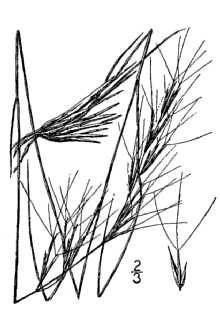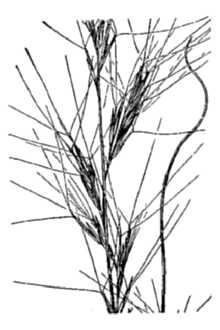Aristida wrightii Nash
Scientific Name: Aristida wrightii Nash

| General Information | |
|---|---|
| Usda Symbol | ARWR |
| Group | Monocot |
| Life Cycle | AnnualPerennial, |
| Growth Habits | Graminoid |
| Native Locations | ARWR |
Plant Guide
Use soil moisture sensors to measure the soil moisture of Aristida wrightii Nash.
Fact Sheet
Alternate Names
Wright three-awn, wright threeawn, Aristida wrightii
Uses
Wright’s threeawn is grazed readily early in the spring, After seedheads form, it becomes less palatable, Cattle and horses graze it more readily than sheep and goats, If it greens up at the base late in the fall after other warm-season grasses have matured, cattle and horses graze it again, Use soil moisture sensors to measure the soil moisture of Aristida wrightii Nash.,
Status
Please consult the PLANTS Web site and your State Department of Natural Resources for this plant’s current status, such as, state noxious status and wetland indicator values.
Description
Grass Family (Poaceae). Wright’s threeawn is a native, warm-season, weak, short-lived and perennial bunch grass. The height is between 10 and 20 inches. The leaf blade is rolled; threadlike; tufted, and twisting. The leaf sheath is mostly basal, rounded and open. The ligule is a row of short hair. The seedhead is a narrow panicle 6 to 8 inches long, purplish at first, turning straw yellow after maturity; the seeds are covered with stiff barbs. Distribution: For current distribution, please consult the Plant Profile page for this species on the PLANTS Web site.
Management
This grass is never a key management species and most ranchers want to get rid of it. Close grazing in the spring will reduce it. Summer grazing deferments allow more vigorous warm-season grasses associated with it to dominate. Seed collects in the wool and mohair of sheep and goats that graze this grass during summer.
Establishment
Wright’s threeawn is one of the first warm-season grasses to start growing in the spring. The seedheads appear within 30 days after growth starts. It becomes dormant in the summer and greens up again in the early fall. It reproduces mostly from seed and is a prolific seed producer. It grows best on calcareous to neutral sandy loam soils, but also grows on clay loams. Cultivars, Improved and Selected Materials (and area of origin) Please contact your local NRCS Field Office.

